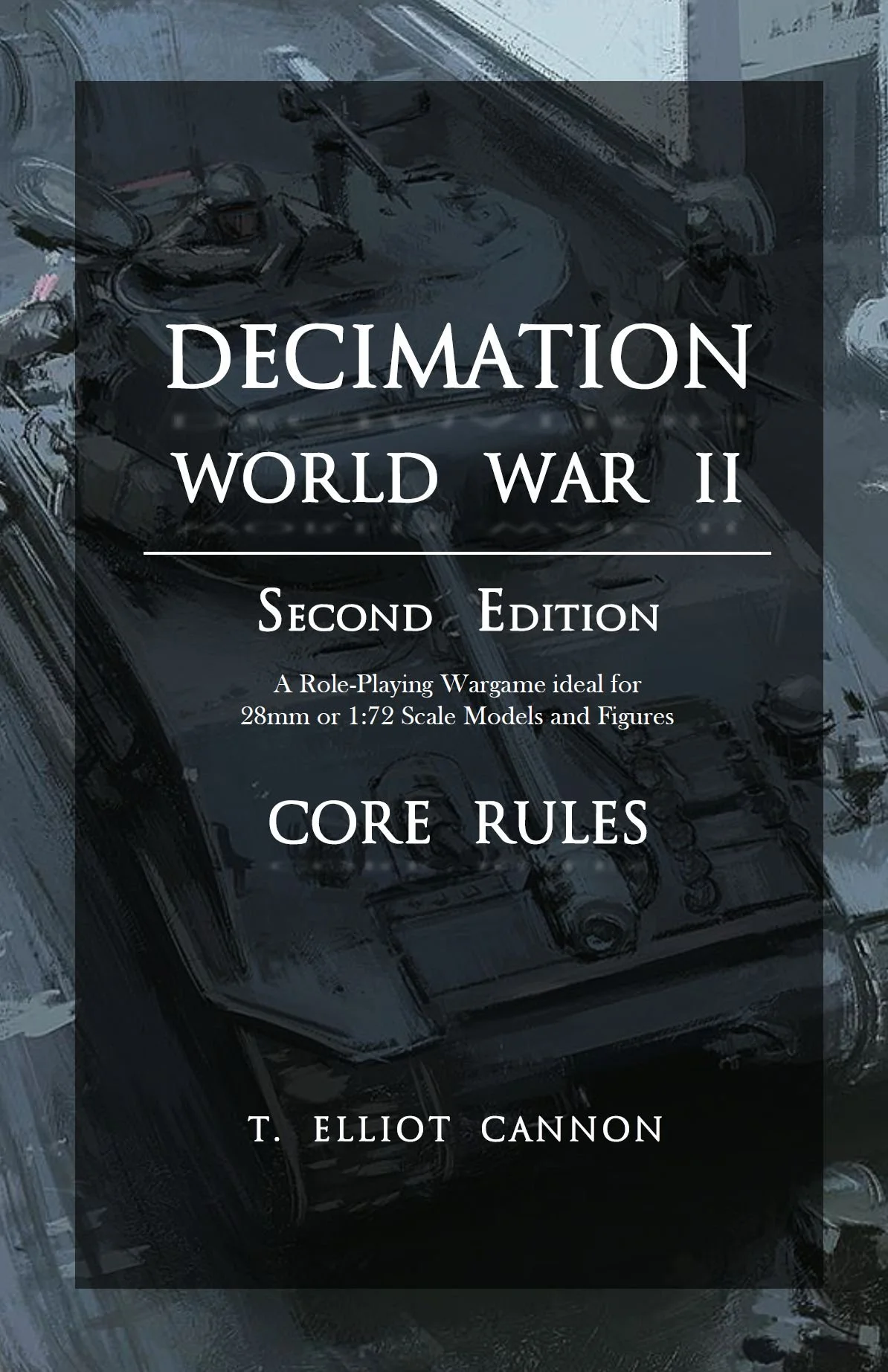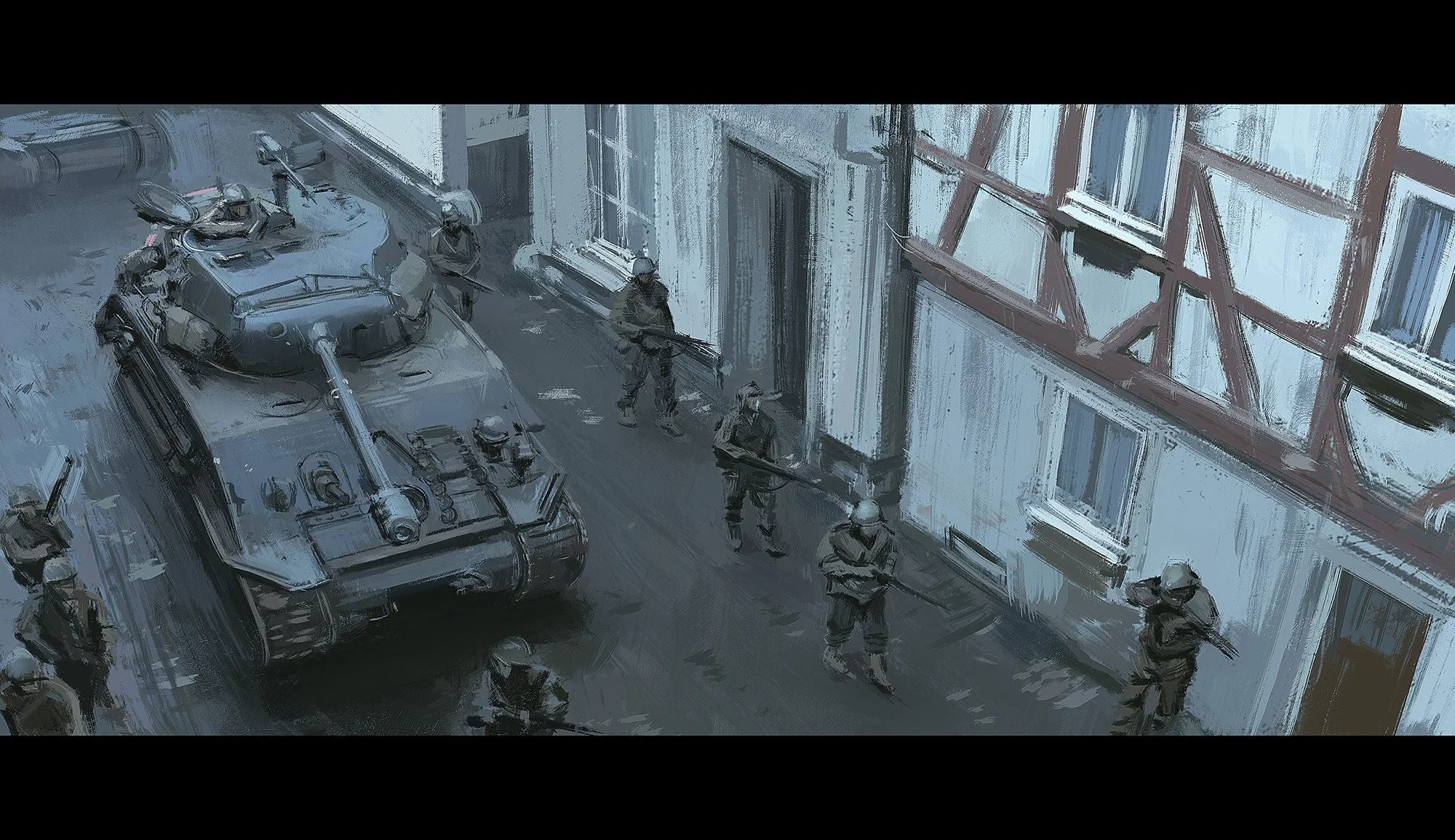Decimation - World War II - Second Edition
Welcome to the Second Edition of Decimation – World War II a role-playing wargame or RPW for short. A role-playing wargame bridges the gap between two types of games – wargames whose players often have scholarly levels of knowledge of military history, weapons, and tactics, and role-playing games, where a vicarious and fantastical sense of adventure drives the player’s every decision.
The game’s theme is a blend between classic, out-of-print, boxed wargames, modern wargaming miniature systems, and a layer of traditional pen-and-paper role-playing game mechanics where every member of your squad matters. Utilize these rules with miniatures and models of 28mm or 1:72 scale figures of infantry, artillery, vehicles, and armor, enjoy collecting, painting, building, and of course, how much gaming space you have. Scale only dictates how we measure distance, not how we measure fun.
Decimation – World War II is unique. Instead of controlling large groups of units at a macro scale – divisions, brigades, regiments, battalions, companies, platoons, or an entire squad as a single actionable unit, you control individual soldiers. By playing at this level, you will find the rules capture the intensity of the combat infantryman. As a player, you will make the decisions for your men leveraging team-focused weapons, training, and tactics to maximize effectiveness.
Unlike war games, Decimation – World War II functions with a Game Master whose responsibility is to prepare the battlefield, scale maps, the mission, the scenario at hand, along with controlling the enemy forces the player(s) encounter. This style of player-to-game master relationship is common among fantasy role-playing games and is essentially the same in Decimation – World War II. For the wargamer, well-versed in historical military squad tactics of the various major powers, you can breathe as much detail here you deem necessary to satisfy your idea of fun. You can play as a straight up head-to-head wargame against a friend without a game master or play out a skirmish solo with the rules where you make objective decisions for both sides. If your focus is a squad vs squad style battle, the rules give you more detail than most wargames, as every shot counts.
Decimation – World War II also provides you with a framework for soldier progression over the course of a multi-session campaign leaning on fantasy role-playing game sensibilities or if you wish, kick off a battle between veteran soldiers with years of experience capturing your wargamer’s passion for historical accuracy.
As mentioned above, a key element of flexibility of the rules is scale. In 1974, I was nine years old and owned a trunk full of Tamiya models, soldiers, tanks and at 1:72, 1:32 (54mm), and 1:35 scales, but we had no game system or rules to do anything except throw dirt clods at our armies and burn things with matches! Imagine our fingernails – and of course the look on our parents faces when they saw a bunker made of twigs with burning Spanish moss billowing white smoke up into the sky. All our Ral Partha and Grenadier lead figures for Advanced Dungeons & Dragons and Lord of the Rings were around 28mm, pretty much matching today’s standard tabletop scale for role-playing games, but even those had no rules to fight battles with.
In Avalon Hill’s Panzer Leader, players stack up to four units per 250-meter hex on eight geomorphic map tiles. Counters represented tanks and units, two-story buildings were a mere inch long, while roads and rivers trickled the width of a Sharpie magic marker line. This was tremendous fun, as we commanded large groups of Panzers, reenacting famous armored battles from 1944-1945. Next was Avalon Hill’s Squad Leader, where squads-sized units, squad leaders, support weapons, and vehicles with a much smaller scale of 1 hex equal 40 meters. These are my childhood classics.
In hex-based boardgames, such as the ones from Avalon Hill in the 1970s, we made decisions, consulted fire tables, and spent most of our time trying to figure out the changes in elevation, distance, fire ratings, and other somewhat complex stuff for twelve-year-olds, but in our imagination, each hex was alive and full of special effects, explosions, flames, tracers, and the thunder of 88mm KwK 36s from our Panzerkampfwagen VI Tiger Ausf. E.
If you grew up with boxed wargames and role-playing games from the 1970s and beyond, I am hopeful you’ll find these rules give you a twinge of nostalgia from your childhood, but with streamlined, non-point-oriented systems found in most wargame rules of today. The game is easy to play, keeping things intuitive using percentile dice for firearm combat and checks to determine quite simply your soldier’s chances for success, with logical situational modifiers for combat action with the weapons of World War II. Most of the game’s complexity is predefined on a Soldier Record for each man, so when fighting begins, game play and dice throws move fast.
I’ve developed these rules for players who come from tabletop role-playing games looking to cross over into World War II wargaming but want more individual control over their soldiers as opposed to fielding large armies, random activation, casualty selection by your opponent, and army point-based systems. Decimation – World War II narrows down the wargame experience to the individual man with single soldiers under your control.
Another unique feature is I structured the game rules around thematic Campaigns which are comprised of multiple objective-based Missions inside of a specific scenario or location, not just pitched battles to the death. In between each mission, retreating, evacuating the wounded, resupply, and receiving replacements for casualties is part of the game’s flow. You never want to fight to the last man, just like the real men who served. You will find that playing this way means every soldier matters and that battlefield decisions you make become more meaningful. Pair this with the Battle Ranks progression system that bolsters lethality and success in combat, and you will never want to lose a man. It changes how you play, creating fear and rewarding tactical thinking.
I have also added extensive rules for anti-tank artillery and tanks that will allow you to have tank on tank battles or combined arms battles.
A final note. I set these rules in World War II, the most savage, cruel, and devastating backdrop of world history. It is not a historical record. The rules have a historical tone to them, but don’t let that limit your imagination. If you want historical accuracy, add it. If you want to have a fire fight along a random, made-up dirt road lined with hedgerows near Saint-Lô, go for it. The goal of any game is to have fun.
T. Elliot Cannon
August 2025


